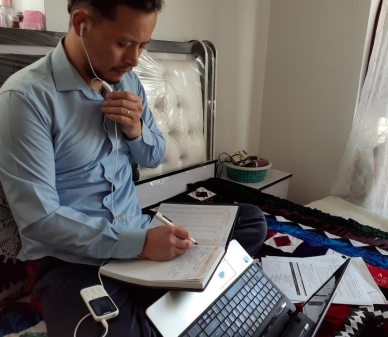Quality, universal education in Afghanistan is fragile. In 2019, an estimated 3.7 million of 10 million children remained out of school. A recent World Bank survey reports that only two-thirds of fourth grade Afghan students have fully mastered the language curriculum for the first grade and less than half of them have mastered the mathematics curriculum for the first grade.
Catch up is needed desperately.
akes-afghanistan-ms._mesrinnoma_ulfat-r.jpg

The COVID-19 pandemic has threatened this arrangement.
akes-afghanistan-by_abdul_samad_maqsudy_8.jpg

And so, the Home Based Learning Project (HBLP) was conceived.
In two short weeks, AKES,A programme leaders had designed self-study packages for students that included reading resources, worksheets, assignments and study planners and at-home activities for pre-schoolers and their families.
Critical to the success of the HBLP is teachers’ continued connection with students. In Afghanistan, this happens over the telephone. Encouragement, learning support, trouble-shooting, assessment and information-giving are all part of a 15-30 minute weekly telephone call students receive from their teacher.
To make this possible, AKES,A has partnered with Roshan Telecommunications, a local company, to fund and distribute 5,350 SIM cards to students and teachers to enable them to communicate with other “closed user group” members on a regular basis.
Ramazan Khademi, an AKES,A programme manager describes HBLP: “The significance of the project lies in the pedagogic approach adopted – we’ve flipped learning and teaching. Students will take more responsibility for their learning by doing what they are able to do independently, so that when the teacher calls them for their one-on one tutorial, they will have time to ask questions and build their understanding of the material they have studied at home. Another key feature of the project is the careful selection of contextually relevant, graded readers that align with each student’s level of English proficiency – at the same time as being interesting to read. Students will not only be improving their English, but they will also be experiencing life from the vantage point of characters from other parts of the world.”
AKES,A leaders are ambitious: They plan to reach over 6,000 students with HBLP SIM cards and teacher coaching.
To underwrite the success of the venture, teachers and administrative staff were trained via webinar and telephone conversations, a brochure was prepared to help parents and community members act as facilitators and supporters of home learning, a telephone call protocol was developed and expectations were set for students to progress through the learning packages based on pre-developed study planners.
In addition to lessons, essential personal hygiene and child protection messages are also included in the home-based learning packages.
From early May in the regions of Baghlan, Badakhshan and Kabul, administration staff, observing safety procedures, have begun to enrol participants and distribute packages and SIM cards. Teachers have also commenced phone coaching. An impressive 2,800 pre-primary, primary and secondary level children and students are registered to date.
“It is been three days that I have been teaching through phones. My students like it. What I really like about HBLP is that I can send and receive questions through SMS,” said Ali Murad Abid an ICT Teacher.
Mesrinnoma Ulfat, an ECD teacher, was similarly enthusiastic, “Our new programme [HBLP] is a great one. In this programme, teachers can teach and assess each individual student. I am encouraging the children to become more responsible for their learning and engaging parents in the learning too. I am happy with this programme and believe it is effective in the children’s development.”
Abdulrab Ahady, a science and mathematics teacher, reiterated, “In this situation, [HBLP] is the best option. With 8,000 minutes of telephone calls and 8,000 SMSs package per month we can effectively deliver the lessons remotely. However, we need to make sure we have proper planning and follow ups.”
Although, HBLP is a new project and approach for Afghanistan, Hafizullah Momin, the Regional Manager for Baghlan feels that the project “is being implemented carefully with quality and it will work well”. This claim is backed up by the high interest already shown by community and students. Ewazullah Maliki, Regional Manager Kabul agrees, “The HBLP seems good in concept and parent’s and student’s reception is also very good at this stage.”
The Home Based Learning Project is an ambitious idea and not without its challenges. The logistics of distribution, initial problems establishing the closed user groups and managing learning within homes rarely set up for study will take time to work through, but early signs show students and their families are embracing the opportunity it offers.
Sultan Sayeed Adeem, a Regional Manager in Badakhshan, sums up the initiative when he says, “The community’s commitment and participation give hope to all of us that the programme might have success in the future and it will end with positive impact.”
This article was first published on the Aga Khan Schools' website.
Latest On AKDN




